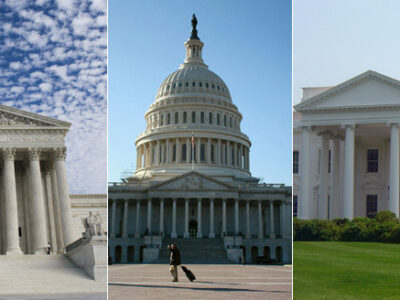Regulatory Policy
Why You Should Care That Congress Might Use the CRA to Overturn California Waivers
Here are at least six reasons.
For the first time ever, the U.S. Senate may vote this week to revoke California’s authority under the Clean Air Act to cut pollution from cars and trucks. The Senate vote is on a resolution to use the Congressional Review Act to overturn three separate waivers EPA granted California to cut pollutants from cars and …
CONTINUE READINGTrump’s Self-Defeating NEPA “Reforms”
Rather than streamlining the process, Trump is gumming up the works.
Trump has taken some dramatic steps in the name of improving use of NEPA, the statute governing environmental reviews of projects. The goal is to speed up the permitting process and make it more efficient. The reality is that his efforts will create chaos and uncertainty, with the likely effect of slowing things down.
CONTINUE READINGNo, DOE, You Can’t Roll Back Product Efficiency Standards
Congress wanted greater energy efficiency over time and banned rollbacks.
The Department of Energy is proposing to rescind key energy efficiency requirements. It is beyond ironic that it is attempting to do so at a time when the President has proclaimed an energy emergency. Trump says the grid is struggling desperately to meet surging power demand. That’s a strange time to eliminate regulations that are saving energy. DOE’s action is also illegal, because the law in question has a provision prohibiting rollbacks. Congress wanted efficiency standards to get tougher over time and included an anti-rollback provision to make sure of that.
CONTINUE READINGBrazil Steps Ahead of the U.S. on Climate Policy
A new emissions trading system is a major step for Brazilian climate policy.
Hopefully, Brazil’s actions will encourage other countries, particularly in South America, to take similar actions. The EU and California have been leaders in this arena, but carbon trading systems are now beginning to get traction outside of the developed world in China and now Brazil. That’s an encouraging sign.
CONTINUE READINGA Stealth Repeal of NEPA
Proposal from House Natural Resources Committee would effectively repeal NEPA
The Republican-controlled U.S. House of Representatives is working on reconciliation language – legislation that can pass via a majority-vote in the Senate, but only so long as it relates to fiscal matters. It looks like House Republicans are going to try and use the reconciliation process to effectively repeal the National Environmental Policy Act (NEPA). …
Continue reading “A Stealth Repeal of NEPA”
CONTINUE READINGPermitting Reform as Policy Stability
Compromise Congressional legislation could dampen the swings of Presidential regulatory policy
I’ve noted earlier the problems that rapid swings in regulatory policy at the Presidential level have caused over the past 12 years, swinging from Obama to Trump I to Biden to Trump II. And, as in so many other ways, the second Trump Administration is ramping up the swings to a whole new level, with …
Continue reading “Permitting Reform as Policy Stability”
CONTINUE READING100 Days of Anti-Environmental Mayhem
A flood of anti-environmental initiatives threatens to undo decades of progress.
the Administration has withheld funding for clean technology, denounced the very idea of environmental justice, and begun a campaign to gut environmental agencies. And that’s only the first hundred days of Trump’s second term.How far Trump gets with this anti-environmental jihad will depend partly on the courts but mostly on politics. Events relating to the economy and provision of basic government services are likely to have as much impact on how things play out than anything specific to the environment.
CONTINUE READINGWhat if DOGE Came for the NFL?
This is what it looks likes like when DOGE takes on a new task.
We know what DOGE is doing to the government. But why stop there? What if they got loose on another part of U.S. society, professional sports? Here’s a picture of what that could look like. June 2026 June 30. New Trump Order: DOGE to Fix Football (NY Times) Trump on Truth Social: “Too long have …
Continue reading “What if DOGE Came for the NFL?”
CONTINUE READINGCorroding the Separation of Environmental Powers
“Who decides?” is the first question to ask about a policy issue. Trump’s answer is “me.”
Biden took actions that federal courts ruled exceeded statutory authority, raised separation of powers issues, or threatened federalism. The difference is that Trump has used brute-force attacks on agencies plus extortion against states rather than taking overt legal actions that courts can review.
CONTINUE READINGTransmission Tangle, Transmission Tango
A new report maps out recent federal actions to improve planning for future electric transmission
On the macro level, just about everyone is a big fan of a rapid, aggressive build-out of new long-distance electric transmission lines – to help meet the anticipated rapid growth in demand for electricity due to the electrification of transportation and energy use in buildings, and the growth of AI. In addition, new big bulk …
Continue reading “Transmission Tangle, Transmission Tango”
CONTINUE READING











